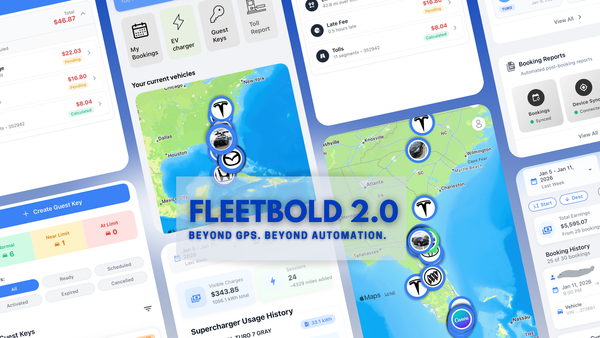Unlimited Miles on Turo: Is It a Smart Choice for Hosts?
Learn about the pros and cons of offering unlimited mileage on Turo. Understand how it affects bookings, vehicle wear, and profitability, and find the right balance for your rental business.

Introduction: Why Unlimited Miles Matter in Turo Rentals
When hosting a vehicle on Turo, one of the key decisions you’ll need to make is whether to offer unlimited mileage or set a limit on how many miles renters can drive during their booking. This decision can significantly impact your booking rates, vehicle condition, and overall profitability. Offering unlimited mileage may seem like an attractive proposition to renters, particularly those planning long trips or looking for flexibility, but it also comes with its own risks.
While it can increase your rental bookings, offering unlimited mileage can lead to higher wear and tear on your vehicle, which may affect the long-term value and maintenance costs. Striking the right balance between flexibility for renters and maintaining the vehicle's condition is essential for sustainable success in the Turo business.
In this blog, we’ll explore the pros and cons of offering unlimited mileage, and help you determine if it’s a smart choice for your Turo rental business. We'll also provide guidance on how to set the right mileage policies that will benefit both you and your renters, ensuring your vehicles remain in great condition while maximizing your profits.
The Pros of Offering Unlimited Miles on Turo
Offering unlimited mileage can be a great way to attract renters and stand out among other listings on Turo. However, like any business decision, it comes with both pros and cons. Let's first look at the advantages of offering unlimited mileage on your Turo listings.
1. Increased Booking Rates
One of the most significant advantages of offering unlimited mileage is the increase in bookings. Renters are often drawn to the idea of unlimited miles, especially when they plan to take longer trips. The flexibility of unlimited mileage makes the rental more appealing to a broader audience, especially those who may be uncertain about their travel plans.
- More Bookings: Renters who are planning long-distance trips will be more inclined to choose your car if it offers unlimited miles. They won’t have to worry about paying extra fees for driving beyond a certain limit.
- Appeals to Road Trip Renters: Unlimited mileage attracts renters who are looking for a car to take on long road trips or explore remote areas without restrictions. These customers value freedom and flexibility, making unlimited miles a compelling offer.
- Better Rental Experience: Renters are less likely to feel stressed about tracking their mileage, making their rental experience more enjoyable, which can lead to better reviews and repeat customers.
2. Competitive Advantage
On platforms like Turo, hosts are competing with others for attention and bookings. Offering unlimited mileage can give your listing a competitive edge. Many hosts set a mileage limit (typically 100-150 miles per day), and some renters may avoid these listings due to the restriction.
- Higher Demand: Listings with unlimited mileage may stand out in the search results, leading to higher demand. Renters are more likely to book a vehicle that offers the flexibility they seek.
- Attracting More Customers: Especially during peak seasons or holidays, travelers may be looking for hassle-free rentals, and unlimited mileage is an attractive feature. This can result in more frequent rentals for your vehicles.
- Premium Pricing: Offering unlimited mileage can also justify higher rental prices, as renters may be willing to pay a little extra for the added convenience and flexibility.
3. Simplified Rental Process
Tracking mileage can be a time-consuming task for both hosts and renters. When you offer unlimited mileage, you eliminate the need to monitor how far the vehicle has been driven, and this can significantly simplify the rental process.
- No Need for Mileage Calculations: You won’t have to deal with calculating extra charges for additional miles, which saves time and reduces potential conflicts with renters.
- Avoiding Disputes: Renters who are concerned about going over a mileage limit might become frustrated, especially if there’s a misunderstanding about how many miles are left on their limit. Offering unlimited miles removes this concern entirely and eliminates the possibility of disputes.
The Cons of Offering Unlimited Miles on Turo
While offering unlimited mileage certainly has its perks, it’s essential to be aware of the downsides and potential risks. Let’s take a look at the cons of offering unlimited mileage.
1. Excessive Vehicle Wear and Tear
The biggest disadvantage of offering unlimited mileage is the increased wear and tear on your vehicle. High-mileage cars tend to depreciate faster and require more frequent maintenance, which can reduce your vehicle's long-term profitability.
- Accelerated Depreciation: As your car accumulates more miles, its resale value decreases. This is especially true if your vehicle experiences frequent use on long trips.
- Maintenance Costs: With more mileage comes more wear on the engine, tires, brakes, and other components. Frequent maintenance, including oil changes, tire rotations, brake pad replacements, and other essential services, will likely increase. Over time, these expenses can outweigh the additional income generated from offering unlimited mileage.
- Shorter Vehicle Lifespan: Vehicles that accumulate high miles will generally have a shorter lifespan, meaning you’ll need to replace them sooner, which could impact your fleet's profitability.
2. Reduced Profitability
While unlimited mileage can increase bookings, it may not necessarily increase your profitability. Offering unlimited miles means you are absorbing more of the cost of the rental in terms of maintenance and depreciation, which can erode your profits.
- Increased Operational Costs: Higher mileage means more maintenance, fuel, and repair costs. While your income may increase due to more bookings, it might not be enough to cover the additional wear on your vehicle, which can lead to lower net profits.
- Financial Strain: If your vehicle needs frequent repairs or parts replacement due to high mileage, these costs can accumulate and significantly reduce the overall profitability of your rental business.
- Not All Renters Respect Mileage Limits: Even if you have a mileage limit, some renters may exceed it. Offering unlimited mileage removes this risk, but it could be at the cost of your vehicle's long-term health.
3. Limited Control Over Vehicle Usage
Another downside of offering unlimited mileage is the lack of control over how far and where your vehicle is driven. Renters may take the vehicle on long, rough trips or drive in areas where roads are poorly maintained, causing additional wear and potential damage.
- Unknown Travel Destinations: Renters may drive your vehicle to unknown or remote locations, which could lead to unforeseen issues like tire wear or even accidents.
- Higher Risk of Damage: While your renters might be responsible drivers, offering unlimited mileage means that your car could be exposed to situations where it could incur damage, such as off-road driving or driving through harsh weather conditions.
Finding the Right Balance
Given the pros and cons of unlimited mileage, many experienced Turo hosts suggest finding a balance by offering a mileage limit that provides ample flexibility for renters while protecting the health of your vehicle.
1. Setting Daily Mileage Limits
Many hosts set a reasonable daily mileage limit, typically between 200 and 300 miles per day. This gives renters the flexibility they need for long-distance trips while still maintaining control over excessive wear and tear.
- Additional Earnings for Excess Mileage: If renters exceed the mileage limit, you can charge extra for the additional miles, creating an additional revenue stream.
- Flexibility Without Sacrificing Vehicle Health: By setting a cap, you ensure your vehicle doesn’t accrue excessive miles while still allowing renters the freedom to use the car for long-distance travel.
2. Special Promotions or Discounts
Offering unlimited mileage during special promotions or off-peak seasons can be an excellent way to boost bookings without significantly affecting your vehicle’s long-term health.
- Increase Bookings During Low Demand: By offering unlimited mileage as part of a limited-time promotion, you can attract more customers during slow seasons.
- Higher Booking Rates: You can offer limited-time discounts for unlimited mileage, allowing you to maximize bookings during times when you might otherwise see fewer rentals.
When Unlimited Miles May Be Beneficial
There are specific situations where offering unlimited mileage on Turo might make more sense. Here are some instances when this approach could be particularly beneficial:
1. Short-Term Promotions
During off-seasons or when there’s less demand for rentals, you can offer unlimited mileage to attract more renters. A limited-time offer can help increase bookings during slower periods and ensure your vehicles are consistently rented out.
2. High-Mileage Vehicles
Older vehicles that are well-maintained may be able to handle more miles without significant issues. If your vehicle is durable and in good condition, you might feel more comfortable offering unlimited miles as the wear and tear may not significantly affect its value.
3. Specific Markets
If your Turo vehicle is located in a market with limited driving distances, such as on an island or in a region with small geographic coverage, unlimited mileage may be less risky for the vehicle's condition. Renters are likely to stay within a confined area, minimizing the impact of excessive driving.
Conclusion: The Smart Approach to Unlimited Mileage on Turo
Offering unlimited mileage on Turo can be a strategic decision that offers flexibility for renters and helps increase bookings. However, it also comes with potential risks, including higher maintenance costs, accelerated depreciation, and less control over how the vehicle is used.
Many hosts find a balanced approach works best. Offering reasonable mileage limits while allowing for additional charges for exceeding the limit can provide flexibility for renters and protect your vehicle’s long-term health.
By understanding the pros and cons, and by considering factors such as vehicle type, market demand, and profitability goals, you can decide whether offering unlimited mileage is the right choice for your Turo rental business.
FAQ: Common Questions About Unlimited Mileage on Turo
- Is unlimited mileage a good option for all Turo hosts?
- It depends on the vehicle’s condition and the market you’re targeting. For older cars or vehicles with high maintenance costs, unlimited mileage may not be the best choice.
- How do I set a reasonable mileage limit for my Turo car?
- A reasonable mileage limit is between 200 and 300 miles per day. This provides enough flexibility for renters while protecting the vehicle from excessive wear and tear.
- Can I offer unlimited mileage during promotions?
- Yes, offering unlimited mileage as part of a promotional offer during off-seasons can help increase bookings and attract more customers.
- How does unlimited mileage affect my vehicle’s resale value?
- Unlimited mileage can accelerate depreciation as your car accumulates more miles. The increased wear and tear can lower the vehicle’s resale value over time.
- Can I charge extra if renters exceed the mileage limit?
- Yes, you can charge extra for any miles that exceed the set daily mileage limit, creating an additional revenue stream while maintaining control over vehicle use.
Final Thoughts:
Deciding whether to offer unlimited mileage on Turo requires careful consideration of your vehicle’s condition, market conditions, and long-term profitability. By weighing the pros and cons and finding the right balance, you can make an informed decision that benefits both you and your renters, ensuring a profitable and sustainable rental business.





